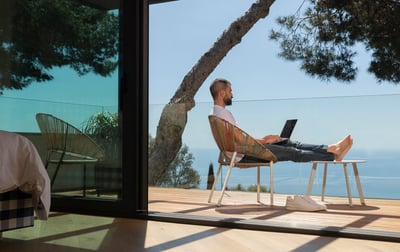Blog / Business Travel / 5 Steps To Incorporate Extended Stay Accommodation Into A Business Travel Programme

Business Travel
5 Steps To Incorporate Extended Stay Accommodation Into A Business Travel Programme
A carefully curated extended stay programme can add a new dimension to a company’s travel policy, offering more choice to guests, and lower costs at the same time. Here are five best practices when adding extended stay accommodation into your travel programme.
Temperature check
Before diving into adding, it’s worth seeing if there’s an appetite for change. Analyse booking patterns. Are lengths of stay increasing? Are employees adding more days for personal holidays on the back of work trips? Are employees booking apartments out of official booking channels? Does your policy encourage bleisure trips, and provide scope for family members or partners? If so, offering more approved, and vetted, extended stay accommodation makes sense.
Work with your mobility counterpart
Business travel can often sit in a different silo to the mobility team. Get these departments to talk to one another, as savings can be made by consolidating spend. Identify which suppliers both divisions spend on, bearing in how many major hotel brands today offer apartments, and you can improve buying power and negotiate discounts.
Communicate new procedures
Apartments and alternative accommodation can have different procedures compared to hotels. Communicate check-in and check-in procedures, and ensure instructions during the stay are clear and consistent. For example, information on how to enter the property if there’s a keypad, or how often the accommodation will be cleaned, should be communicated in advance. Also let employees know how they can communicate with the hospitality operator. For example some brands communicate with guests via Whatsapp, or have their own app.
Educate your travellers
It’s important to spell out the reasons why the company is incorporating serviced apartments, or other alternative accommodation. The upsides will include more space (on average 30% more than a hotel room); a more home-like feel with many brands focusing on their design; better choice of amenities (from kitchens and washing machines to smart TVs); and for travellers concerned about their carbon footprint, in many cases apartments provide a greener stay. And for cost-conscious employees, remind them serviced apartments can save the business money in the long term.
Think beyond serviced apartments
When it comes to inventory, there can be some misconceptions that serviced apartments is the only type of extended stay accommodation. There’s much more, including co-living properties. These are growing in popularity, particularly in Asia, and focus on community — it’s no longer about sharing bathrooms, as co-living properties will often include group activities and work spaces that provide a social lifeline to business travellers on longer stays.
Bleisure Travel Explained: Meaning, Benefits & Business Impact
Previous Article


